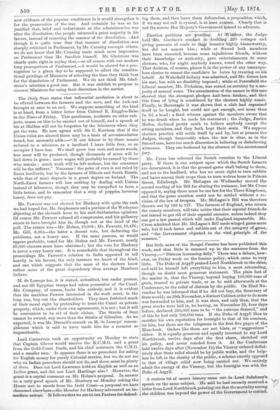But little news of the Bengal Famine has been published
this week, and that little is summed up in the sentence from the Viceroy,—" Distress increasing daily." There-was a debate, how- ever, on 'Friday week on the famine policy, which came to very little. The Duke of Argyll-praised Lord Northbrook to the skies, and said-he himself left everything to him, a most astounding, though no doubt most generous statement. The plain fact of the matter is, that the Viceroy, beyond buying 100,000 tons of grain, trusted to private trade, or as he said afterwards at the Conference, to the relief of distress by the public. On 22nd No- vember he was informed that if he did not hug, the Secretary of State would; on 29th November, a distinct Cabinet order to do more was forwarded to him, and it was then, and only then, that the great stocks were laid in, he having, on November 25, four days before, declared 250,000 tons to be "the extreme demand," and of this he had only 100,000 tons. If the Duke of Argyll likes to sacrifice his own reputation for foresight to that of his nominee, let him, but there are the telegrams in the first five pages of the Blue-book. Orders like those are not hints, or " suggestions " either. It is equally generous and equally incorrect to say Lord Northbrook, twelve days after the first alarm, sketched out his policy, and never receded from it. At the Conference held twelve days after (November 10) the Viceroy ordered defini- tively that State relief should be by public works, and the help- less be left to the charity of the public, a scheme exactly opposed to that of village relief now being carried out. We entirely admit the energy of the Viceroy, but the foresight was with the Duke .of -Argyll.


































 Previous page
Previous page